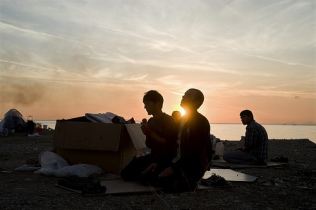The Religion Factor: A missing link in Migration Studies? Part One

This summer I was very happy to be able to attend a Summer School named ‘Cultures, Migrations, Borders’ on the Greek island of Lesvos. The programme aimed at MA students and PhDs from different fields, and although there were no lecturers nor any other students with a Religious Studies background, I assumed the subject of religion would have a place in the programme. I was convinced that Religion is crucial to any field within the social sciences.
Very soon after starting the programme, I realized how wrong these assumptions were. Religion was noticed in only two or three of the 18 lectures given, and it was only mentioned in passing, as a label, a way to classify groups of people. Everybody seemed to agree that the main explanation for the choices people make and their behavior in general is not in religious beliefs, but it lies in (post)colonialism, politics, rational choice theory, economics and, foremost, power relationships. It started to dawn on me that although we were all looking at the same issues, we were all seeing different things. That is how much our outlook and assumptions are shaped by the faculty we are educated in – or, as I would like to put it, how it shapes your beliefs about the world itself. Of course, I am not saying that the concepts mentioned above are not important, they certainly are. But after this experience, I also believe even more than before that Religious Studies does have an important contribution to make to the study of migrations and borders.
Every day, thousands of people all over the world make the decision to leave their homes, families, jobs and everything they know to go to another place, hoping to be able to build a better future there. In some cases, this seems hardly like a choice at all, when choosing to stay would mean choosing to be imprisoned, tortured, or killed, because of one’s gender, ethnicity, political views, sexual orientation, or religious beliefs. With as much as 85-90% of the world population adhering to a religion (1), for many of these people, religion is an integral part of how they look at the world, and therefore also of the decision-making process that leads up to the choice to leave. To make this choice, people need to believe that it is OK to go somewhere else in search of a better life, that it is better to flee than to be killed for their beliefs, that they are not betraying a nation or people in leaving it, etc. People might need to have their plans affirmed or receive a blessing by a religious person like a priest or a sheikh, or they might want to pray and read or get inspired by sacred books. They may feel much better about their plan to leave when they have read a text encouraging them to go, for example this one from the Qur’an: ‘Indeed, those whom the angels take [in death] while wronging themselves – [the angels] will say, “In what [condition] were you?” They will say, “We were oppressed in the land.” The angels will say, “Was not the earth of Allah spacious [enough] for you to emigrate therein?” For those, their refuge is Hell – and evil it is as a destination.’ (2) Or, this one from the Bible: ‘Now Yahweh said to Abram, “Get out of your country, and from your relatives, and from your father’s house, to the land that I will show you’. (3)
For many migrants, especially when they are poor, the choice to leave is the beginning of a very dangerous journey to the place where they hope to find a better life, a journey that many do not survive. Migration, for this group, is a gamble that involves taking the risk of dying, a matter of life and death and ultimate questions. Well, does it get any more religious than that? I hardly think so.
Geertje den Oudsten is a research-master student at the University of Groningen, working on religion and migration.
References:
(1) It is hard to find any reliable data on this subject, and on the internet many different numbers are circulating. This number is based on the information in the CIA World Factbook (https://www.cia.gov/library/publications/the-world-factbook/geos/xx.html) and the Association of Religion Data Archives (http://www.thearda.com/download/download.aspx?file=Data%20from%20the%20ARDA%20National%20Profiles,%202011%20Update%20-%20Religion%20Indexes,%20Adherents%20and%20Other%20Data.XLS) over 2009 and 2011 respectively.
(2) Qur’an 4:97, Sahih International translation
(3) Genesis 12:1, World English Bible translation

